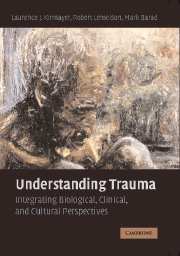Book contents
- Frontmatter
- Contents
- List of Figures
- List of Tables
- List of Contributors
- Foreword by Robert Jay Lifton
- Preface
- List of Abbreviations
- Introduction: Inscribing Trauma in Culture, Brain, and Body
- SECTION I NEUROBIOLOGICAL PERSPECTIVES ON TRAUMA
- SECTION II CLINICAL PERSPECTIVES ON TRAUMA
- 8 Cognitive Behavioral Treatments for Posttraumatic Stress Disorder
- 9 PTSD Among Traumatized Refugees
- 10 PTSD: A Disorder of Recovery?
- 11 The Developmental Impact of Childhood Trauma
- 12 Adaptation, Ecosocial Safety Signals, and the Trajectory of PTSD
- 13 Religion and Spirituality After Trauma
- 14 Posttraumatic Suffering as a Source of Transformation: A Clinical Perspective
- SECTION III CULTURAL PERSPECTIVES ON TRAUMA
- Epilogue: Trauma and the Vicissitudes of Interdisciplinary Integration
- Glossary
- Index
- References
12 - Adaptation, Ecosocial Safety Signals, and the Trajectory of PTSD
Published online by Cambridge University Press: 27 July 2009
- Frontmatter
- Contents
- List of Figures
- List of Tables
- List of Contributors
- Foreword by Robert Jay Lifton
- Preface
- List of Abbreviations
- Introduction: Inscribing Trauma in Culture, Brain, and Body
- SECTION I NEUROBIOLOGICAL PERSPECTIVES ON TRAUMA
- SECTION II CLINICAL PERSPECTIVES ON TRAUMA
- 8 Cognitive Behavioral Treatments for Posttraumatic Stress Disorder
- 9 PTSD Among Traumatized Refugees
- 10 PTSD: A Disorder of Recovery?
- 11 The Developmental Impact of Childhood Trauma
- 12 Adaptation, Ecosocial Safety Signals, and the Trajectory of PTSD
- 13 Religion and Spirituality After Trauma
- 14 Posttraumatic Suffering as a Source of Transformation: A Clinical Perspective
- SECTION III CULTURAL PERSPECTIVES ON TRAUMA
- Epilogue: Trauma and the Vicissitudes of Interdisciplinary Integration
- Glossary
- Index
- References
Summary
INTERNATIONAL CONCERNS ABOUT PTSD
In recent years, Western concepts of psychological trauma have come under increasing challenge, particularly from a transcultural perspective (see Silove, 1999a). The evolving critique is based on several loosely interrelated assertions (Summerfield, 1999): that the psychiatric category posttraumatic stress disorder (PTSD) has its roots in the historical and social imperatives of the 1970s when there was a need to vindicate and advocate for Vietnam combat veterans returning to a hostile public reception in the USA; that, in turn, the medicalization of PTSD spawned a self-sustaining and self-serving trauma counseling industry; and that the consequences, intentional or otherwise, have been to encourage a culture of victimization, compensation seeking, and unrealistic expectations. Concerns have been raised, in particular, about the proliferation of psychological debriefing after disasters, in spite of mounting evidence that indiscriminate interventions of that type may be ineffective, and in some cases injurious, to natural recovery (Raphael & Wilson, 2000). The added concern is that the professional appropriation of psychological trauma may undermine communal support mechanisms that traditionally provided comfort to survivors.
Such concerns are particularly relevant to conflict-affected countries that lack the resources and skills to apply best practice treatments for PTSD. Issues of feasibility and affordability make it impossible to offer best practice interventions (whether pharmacological or cognitive behavioral) on a mass scale to the large portion of trauma-affected populations meeting criteria for PTSD soon after major humanitarian disasters.
- Type
- Chapter
- Information
- Understanding TraumaIntegrating Biological, Clinical, and Cultural Perspectives, pp. 242 - 258Publisher: Cambridge University PressPrint publication year: 2007
References
- 15
- Cited by



